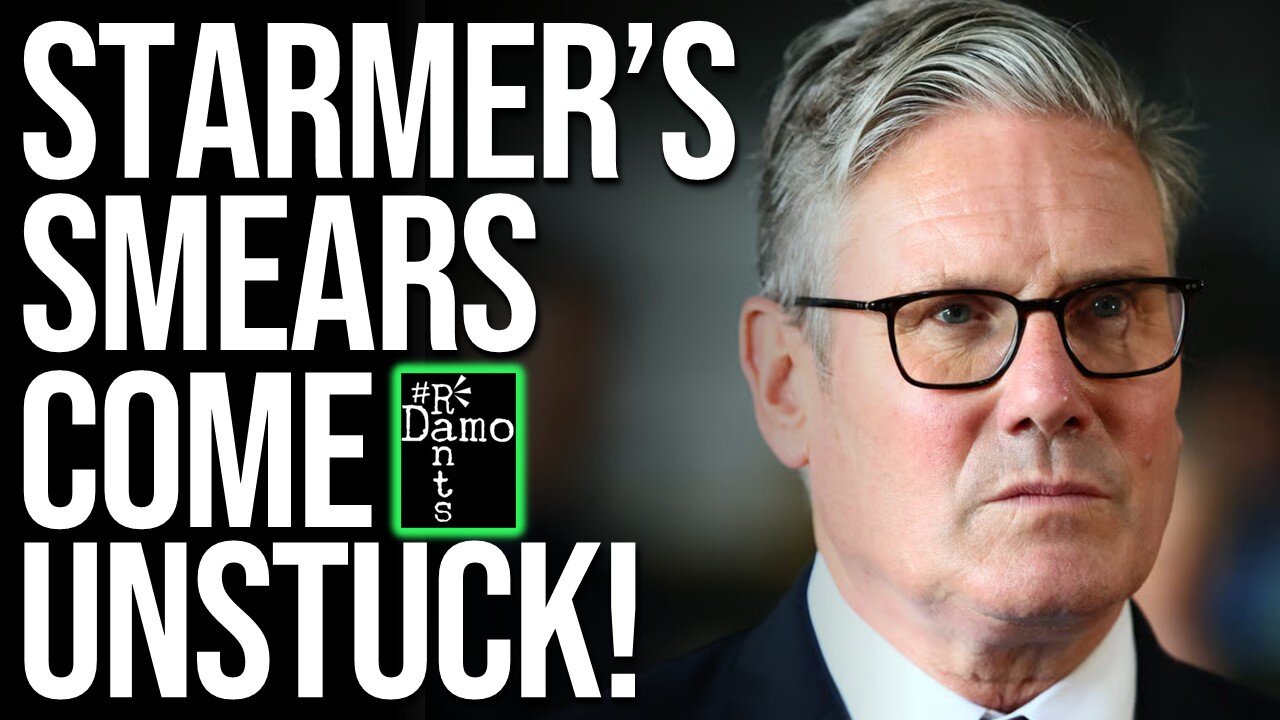Premium Only Content

Starmer Thought These Smears Would Stick — They Stuck to Him Instead
Right, so when Keir Starmer claimed Palestine Action had targeted “Jewish-owned businesses,” he didn’t just smear a protest group — he performed the very conflation antisemitism campaigners have spent decades warning against, merging Jewish identity with the policies and military actions of the Israeli state. It was a line delivered to justify one of the most draconian political moves in recent British history: the proscription of a non-violent direct action group under terrorism laws. By reframing the dismantling of arms factories and the splashing of red paint on war profiteers as an attack on Jewish people everywhere, Starmer not only shielded powerful companies from scrutiny, but also corroded the fight against genuine antisemitism. How many people did he boot out of the party on trumped up claims of that? In his Britain, his government, his Labour Party protesting genocide becomes extremism, and the claims of racism is repurposed to silence those exposing our complicity in it, even as Starmer himself has apparently now caught himself out.
Right, so it began in the shadows didn’t it? A splash of red paint against the grey monotony of a military airfield. Palestine Action activists breached the perimeter of RAF Brize Norton and drenched two large military transport planes in a vivid, blood-coloured protest against Britain’s complicity in the bombardment of Gaza. Ministers rushed to frame it as an “attack on our armed forces,” a direct assault on national security, this is an act of terror. Yet these planes were not sovereign military assets at all. They belonged to Polygon Global Partners, a London-based hedge fund, leased back to the Ministry of Defence through the labyrinth of private finance arrangements that have quietly privatised swathes of Britain’s military infrastructure. Yes, even our military is not safe from privatisation. This was not an act against the RAF in any meaningful sense, but a deliberate targeting of a financialised military supply chain in which private investors profit from the machinery of war. The symbolism was sharper than the government dared admit: the protest was aimed at corporate profiteering from state violence, not at the service personnel who operate under orders.
This incident would later become part of the evidentiary basis of course for one of the most far-reaching uses of counter-terrorism powers in modern British history. Back in June, the government announced the proscription of Palestine Action under the Terrorism Act 2000. This was not the banning of an armed insurgency, nor of a clandestine group accused of planning to kill civilians. It was the criminalisation of a direct action protest movement whose signature tactic is property damage against companies complicit in Israel’s arms trade. As Al Jazeera reported, this marked the first time a non-violent protest movement had been proscribed under terrorism legislation in the UK. The precedent is chilling: a blunt expansion of the definition of terrorism to encompass acts of political disruption that damage property, even where there is no threat to human life.
The legal and political stakes are immense. Under the Terrorism Act, membership of a proscribed organisation is itself a serious criminal offence, punishable by up to fourteen years in prison, we have seen arrests made in connection with this on a weekly basis ever since as weekend protests against the proscription and against Israeli genocide erupt. Merely attending a Palestine Action meeting, donating funds, or displaying its logo, or even support on a placard could lead to prosecution. The government’s move was immediately criticised by civil liberties lawyers, human rights organisations, and grassroots activists across multiple movements. The question that arose instantly was whether the law was being applied proportionately, or whether it was being stretched to serve a political agenda. That is the background as we know it thusfar isn’t it? Well here’s the latest.
You see Keir Starmer’s public defence of the proscription has now deepened the controversy. According to The Times, hardly fans of Starmer no matter how Tory he is or how much he kisses Murdoch backside, but equally no fans of Palestine Action either, he claimed that Palestine Action had targeted “Jewish-owned businesses.” The implication, intended or not sticks out like a sore thumb though: that these actions were driven by antisemitism rather than political opposition to Israel’s bombardment of Gaza or the UK’s role in supplying the weapons. Smacks of weaponising antisemitism to me, to justify this proscription, which the public hate and is going to be dragged through a judicial review. The fact is that the vast majority of Palestine Action’s protests have targeted arms factories, corporate landlords housing those factories, and logistical enablers of the military supply chain. The “Jewish-owned business” cited by Starmer was in Stamford Hill, where activists alleged—incorrectly according to the owner—that the property was linked to Elbit Systems, the Israeli arms manufacturer. Even if the allegation was unambiguously accurate, the framing collapsed the distinction between Jewish identity and the policies of the Israeli state, a conflation that many Jewish critics of the government’s position and critics of Israel especially have themselves described as antisemitic.
Indeed, opposition from within the Jewish community has been both vocal and substantive. An open letter signed by prominent academics and activists, including Judith Butler, Angela Davis, and Naomi Klein, calling the ban “an attack on fundamental freedoms” and warning of the precedent it sets for repressing dissent. Days earlier, more than 400 British Jews signed a letter, reported by 5Pillars UK and Anadolu Agency, denouncing the proscription as “illegitimate and unethical” and rejecting the government’s framing. These signatories made clear that targeting companies complicit in war crimes is not an attack on Jewish people, and that conflating anti-Zionism with antisemitism is a dangerous distortion.
The criticism has not been limited to domestic voices either, its gone international too. Last month, UN High Commissioner for Human Rights Volker Türk, in comments covered by Press TV, described the proscription as “disproportionate and unnecessary” and “an impermissible restriction” on the rights to freedom of expression and assembly guaranteed by the European Convention on Human Rights. His intervention placed the UK in the dock of international opinion, casting the ban as a breach of its treaty obligations. Amnesty International, in a letter to the Met Police, warned that arresting individuals merely for carrying Palestine Action placards would itself violate international human rights law, yet they’ve carried on regardless.
The government’s case is further undermined by the lobbying history behind it which is getting little attention, especially in the mainstream. Declassified UK revealed in June that Elbit Systems’ UK security director, Chris Morgan, wrote directly to the policing minister urging that the activists’ “prolific and serious” actions be met with stronger measures. This came after years of Israeli government ministers privately pressing their UK counterparts to curb the protests, including a 2020 meeting in which then Foreign Secretary Dominic Raab promised to address repeated demonstrations at Elbit’s London offices. These interventions illustrate the degree to which foreign corporate and governmental interests have sought to shape Britain’s domestic security agenda.
Elbit has not been alone. In December 2022, Palestine Action activists broke into the Welsh factory of US defence contractor Teledyne Labtech, causing more than £1 million in damage. According to The Canary and Declassified UK, campaigners allege that Teledyne produces components for Israeli military drones, an allegation the company denies. Following this protest, former Chief of the General Staff and current Conservative peer Lord Richard Dannatt personally lobbied government ministers on Teledyne’s behalf, portraying the activists as a national security threat. Dannatt’s intervention exemplifies the revolving door between the military establishment and corporate defence interests, and the ease with which protecting private profits can be reframed as protecting the nation.
The rhetoric surrounding the proscription has, in some quarters, gone far beyond legal measures. As Middle East Eye have reported, Reform UK MP Rupert Lowe suggested that activists engaged in such actions should “expect to be shot.” Such statements normalise political violence against protesters, especially when they come from elected officials. In combination with the government’s terrorism designation, they create a climate in which non-violent civil disobedience is treated not merely as criminal but as a legitimate target for lethal force.
The judicial review that has been secured is significant precisely because such cases rarely reach this stage. The permission stage of judicial review is designed to filter out weak claims; that the High Court has allowed this one to proceed suggests the judge sees a plausible argument that the ban is unlawful or disproportionate and given we are talking protesters here throwing paint around, that seems quite obvious to anyone not in hoc to Israeli interests, or are just plain fascist. The case will test the core principles of proportionality and legitimate aim under human rights law. Is the government’s true objective to protect public safety, or to silence a political movement that has effectively disrupted the UK’s role in arming Israel?
The potential precedent whichever way this goes will be huge. If the proscription stands, the scope of terrorism law will have been expanded to cover political property damage. Climate activists blocking oil terminals, trade unionists sabotaging strike-breaking operations, anti-fascists disabling far-right propaganda equipment—all could, under this interpretation, be branded as terrorists. The chilling effect on civil society would be immediate.
To understand the gravity of this moment, lets slap some historical context on this. The UK has a long record of suppressing disruptive protest when it threatens entrenched power. In the 1980s, anti-apartheid campaigners who targeted South African trade links faced police raids, infiltration, and political vilification. Irish solidarity activists in the 1970s and 1980s were routinely monitored, harassed, and in some cases prosecuted under security legislation. More recently, environmental movements like Extinction Rebellion and Just Stop Oil have been categorised as “domestic extremists” and subjected to surveillance, even when their tactics were non-violent. What distinguishes the Palestine Action case is the leap from monitoring and prosecution under ordinary criminal law to outright proscription under terrorism powers. It is one thing to charge activists with criminal damage, often they have done this; it is quite another to criminalise the very act of organising such protests, which is where Starmer has stupidly jumped to.
The Brize Norton incident, when examined honestly, is emblematic of the deeper truths the government’s narrative obscures. Activists targeted not “our troops” but the assets of a hedge fund embedded in the privatised military economy. This is consistent with Palestine Action’s stated mission to disrupt the infrastructure of war profiteering. But acknowledging this would require confronting uncomfortable realities: that Britain’s defence apparatus is deeply enmeshed with private capital; that foreign and corporate interests exert significant influence over national security policy; and that effective protest against these interests can be, and now has been, redefined as terrorism.
Internationally, the UK’s move aligns with a broader trend of Western governments using security laws to shield Israel from effective grassroots opposition. Since the International Court of Justice’s provisional measures ruling in January 2024, ordering Israel to prevent acts of genocide in Gaza, the pressure on states like Britain to rein in Palestine solidarity movements has intensified. By criminalising one of the most disruptive elements of that movement, the UK is not acting to protect its citizens at all, but to protect the diplomatic and economic position of an ally accused of the gravest of crimes.
Ultimately, the proscription of Palestine Action is a litmus test for the health of democratic freedoms in Britain. If democracy means anything, it must include the right to disrupt, to inconvenience, even to damage property when that is the only means of exposing and resisting grave injustice. This right is not absolute; it must be balanced against other rights and interests. But it cannot be extinguished at the whim of a government acting in concert with corporate lobbyists and foreign powers. The judicial review offers a narrow but vital opportunity to draw a line. If it fails, the precedent will not stop with Palestine Action. The same powers could—and, given history, almost certainly would—be used against others. That Starmer has now seemingly resorted to conflating Jewish identity with Israel over these Palestine Action attacks smacks of desperation from an increasingly unpopular and woefully inept politician. His authoritarianism needs to be reined in and the courts now need to do so.
Speaking of military privatisation though, just as we thought Keir Starmer had ended his spy flights over Gaza from RAF Akrotiri on Cyprus, that isn’t the case at all, they’re still carrying on, he’s just privatised them, he’s subcontracted these missions out to a US firm to carry out instead. Perhaps the news of these flights happening, reported by Declassified UK for so long, now finally being picked up by mainstream sources, has driven Starmer into hiding, but not to stop them. Get all the details of that in this video recommendation here as your suggested next watch.
Please do also hit like, share and subscribe if you haven’t done so already so as to ensure you don’t miss out on all new daily content as well as spreading the word and helping to support the channel at the same time which is very much appreciated, holding power to account for ordinary working class people and I will hopefully catch you on the next vid. Cheers folks.
-
 LIVE
LIVE
Badlands Media
9 hours agoBaseless Conspiracies Ep. 153
5,338 watching -
 23:51
23:51
Stephen Gardner
2 hours ago🚨Trump did the UNTHINKABLE!
16.5K41 -
 2:54:14
2:54:14
Barry Cunningham
5 hours agoBREAKING NEWS: PRESIDENT TRUMP SAYS HE MAY INVOKE THE INSURRECTION ACT! AND NOW WE KNOW WHY!
25.6K13 -
 40:13
40:13
Clownfish TV
11 hours agoMagic the Gathering Champion BANNED from Tournament Over MAGA Hat?! | Clownfish TV
9.36K19 -
 2:49:47
2:49:47
TimcastIRL
4 hours agoTrump Considers Invoking INSURRECTION ACT To Deploy National Guard to Portland | Timcast IRL
157K80 -
 10:05:38
10:05:38
Dr Disrespect
12 hours ago🔴LIVE - DR DISRESPECT - BLACK OPS 7 - GIVE ME BACK MY NUKE
130K16 -
 LIVE
LIVE
Drew Hernandez
2 hours agoTARGETED LEFTIST TERRORIST ATTACK IN CHICAGO & ISRAEL GEOFENCING U.S. MEGA CHURCHES
940 watching -
 8:58
8:58
Degenerate Jay
13 hours agoXbox Game Pass Is Getting Ridiculous
9.48K -
 7:03
7:03
GBGunsRumble
1 day agoGBGuns Range Report 05OCT25
5.99K2 -
 1:32:30
1:32:30
Glenn Greenwald
9 hours agoWill the War in Gaza Finally End? Flotilla Activists Predictably Abused in Israel's Dungeons; Van Jones' Revealing Joke about "Dead Gazan Babies" | SYSTEM UPDATE #527
90K66
